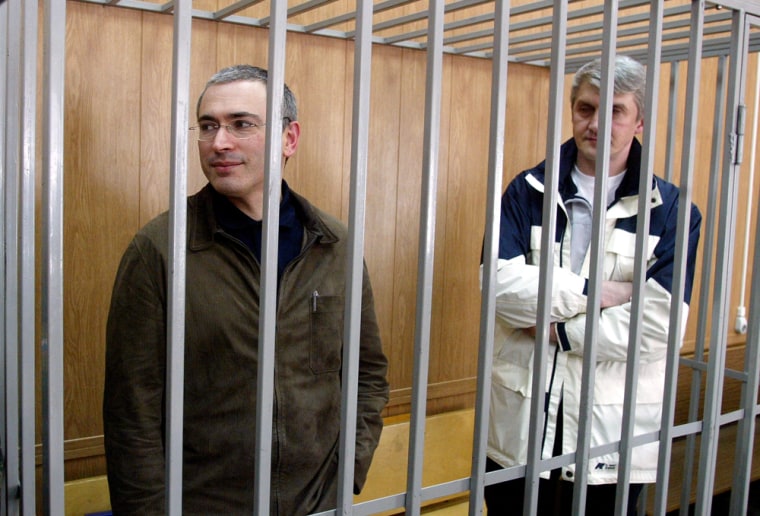The court reading the lengthy verdict in the trial of oil tycoon Mikhail Khodorkovsky on Wednesday adjourned until Thursday, sending the process into a fourth day.
Khodorkovsky supporters say the Moscow court, which is reading the verdict aloud for only four or five hours a day, appears to be aiming to extend the process long enough to sap public interest in the politically sensitive case.
Earlier this week, the court finished reading summations of the prosecution’s case on six of the seven charges against Khodorkovsky and business partner Platon Lebedev. The reading’s phrasings appeared to give clear indication that both would be found guilty, but the court first must read summations of witness testimony.
A news report on Tuesday said the court had found them guilty on most of the charges, but Yelena Lipster, an attorney for Lebedev, said that the court’s readings did not constitute a firm guilty verdict.
Khodorkovsky, the former head of the Yukos oil company who was once believed to be Russia’s richest man, was charged along with Lebedev with tax evasion, fraud and embezzlement, among other crimes. Prosecutors have asked for the maximum 10-year prison sentence.
There was wide speculation that the court would impose a lighter sentence in the case, which has raised concern about Russia’s respect for the rule of law. Khodorkovsky supporters contend the case against him was Kremlin-directed revenge for his funding of opposition parties.
One of Khodorkovsky’s lawyers, Genrikh Padva, said phrasings in the verdict “give hope for a softer sentence,” the ITAR-Tass news agency reported.
The lengthy verdict process began Monday; it was not clear when it would be completed.
Police on Tuesday beefed up security precautions outside the court building, erecting crowd barriers and metal detectors on both sides of the street and stopping passing cars for inspection. As Khodorkovsky’s parents were waiting for admission to the courthouse, reporters asked what they expected from the day.
“Tell me what’s good here,” Boris Khodorkovsky responded, referring to the heavy security.
About 100 anti-Khodorkovsky demonstrators carried placards bearing slogans such as “Khodorkovsky, return our money.” That’s a reflection of the resentment among many Russians of businessmen like Khodorkovsky who became enormously wealthy in the 1990s economic free-for-all following the collapse of the Soviet Union.
A pro-Khodorkovsky demonstration outside the court a day earlier was forcefully dispersed by police. Sergei Mitrokhin, a liberal politician who said he was detained and beaten in that incident, said Tuesday’s demonstrators had been seen leaving the Federal Security Service headquarters in Moscow in the morning, implying their demonstration had official organization.
Khodorkovsky was delivered to a side entrance in an armored van, out of public view.
The reading of the verdict could still take days to complete, but the first words out of the judge’s mouth Monday left little doubt that Russia’s one-time richest man would be found guilty on all charges, his lawyers said.
Supporters of the former head of the Yukos oil company say he’s the victim of a campaign rooted in Kremlin anger at his political ambitions, and one of his lawyers said the court is so subservient to prosecutors that its verdict is parroting their indictment “right down to the spelling errors.”
The trial — the biggest in post-Soviet Russia — has raised wide questions about the nation’s respect for rule of law and rattled many investors who had been thinking of getting into Russia’s booming economy.
Khodorkovsky has been imprisoned since October 2003, when he was seized by special forces in a dramatic raid on his jet while it sat on the tarmac of a Siberian airport. Lebedev was arrested three months earlier.
Both were charged with crimes related to the 1994 privatization of a fertilizer-component company. During his 19 months in prison, his crown-jewel oil company Yukos has been hit with billions of dollars in back tax bills, and its key production subsidiary was acquired by the state after a murky auction ordered to meet part of the tax arrears.
Both at home and abroad, the case has raised questions about President Vladimir Putin’s commitment to the rule of law.
Khodorkovsky and Lebedev are charged with rigging the 1994 privatization auction, stripping profits from a major fertilizer component maker, illegally using onshore tax havens to slash Yukos’ tax bills and dodging millions in personal income tax.
Yukos’ market value once was as high as $40 billion but has plunged to $2 billion.
